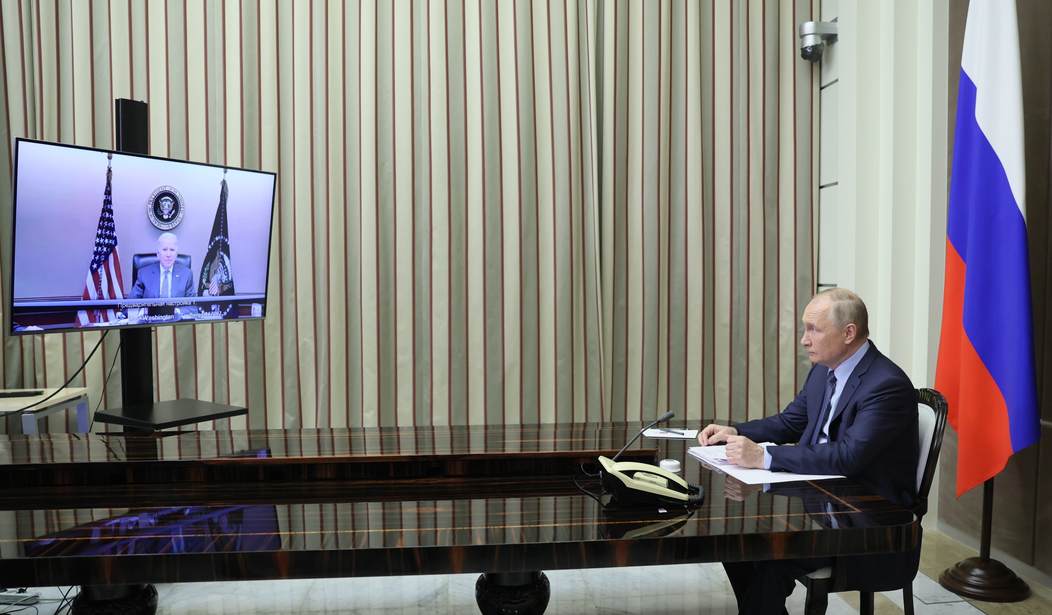This weekend, representatives from the G7 countries (including the United States) met in Liverpool, England to discuss the escalating situation on the border between Russia and Ukraine. After two days of talks, they released a joint statement yesterday intended to demonstrate solidarity and slow down Vladimir Putin’s apparent preparations for an invasion. Troop levels on the Russian side of the border have now surpassed 175,000 according to the latest intelligence reports. The G7 statement was strongly worded, if vague, promising “massive consequences” and a “severe cost” in response if Putin’s forces were to cross the border. (Politico)
Russia will face “massive consequences and severe cost” if it pursues further military aggression against Ukraine, foreign ministers from the G7 group of democratic powers warned Sunday.
The G7 countries are united in their “condemnation of Russia’s military build-up and aggressive rhetoric towards Ukraine,” ministers said in a statement following two days of talks in the northern English city of Liverpool.
“We call on Russia to de-escalate, pursue diplomatic channels, and abide by its international commitments on transparency of military activities,” reads the statement, on behalf of ministers from Canada, France, Germany, Italy, Japan, the United Kingdom and the United States. “Russia should be in no doubt that further military aggression against Ukraine would have massive consequences and severe cost in response.”
That all sounds well enough I suppose, but what was missing from the announcement was any level of detail as to what the “massive consequences” would be. Joe Biden already threatened Putin with significant economic sanctions and other financial impositions, but Putin basically shrugged it off. A Kremlin spokesperson said that additional sanctions “will not have any effect.” And at least thus far, the threats don’t seem to be changing anything. Putin is still amassing troops in the same place.
The big sticking point at this time seems to have less to do with the internal conflict between Russians in Ukraine and the Ukrainian government and more to do with NATO. Putin continues to insist that he wants to see “reliable, legally fixed guarantees” that Ukraine will not be invited to join NATO and that no NATO nations will deploy new offensive weapons in that country. The G7 was having none of it, saying that Ukraine has “the right to decide on its future alignment.”
Regular readers likely know that I’m about the last person that would defend Vladimir Putin or Russia, but even I have to admit that the argument Putin is making isn’t completely off the wall. Russia has long held the position that it would oppose any further eastward expansion of NATO, mostly because NATO primarily exists as a bulwark against future Russian incursions into neighboring territory. Sitting back quietly as NATO plants its flag literally on Russia’s southern doorstep and close to its only access to a warm water port is probably a lot to ask of them. Also, when the subject of installing missiles that close to the Russian border comes up, visions of the Cuban missile crisis come to mind.
That’s not to say that Russia has the right to simply invade and swallow up more (if not all) of Ukraine’s territory or that we shouldn’t respond if they do. But it would be nice to see a diplomatic resolution to this before it turns into a shooting war. There’s nothing stopping Ukraine’s government from being aligned with and friendly toward NATO nations and the west without actually making them an official member of the alliance. Perhaps instead of the G7 it should be NATO itself responding to Putin’s statements. They could offer assurances of mutual trade agreements and other arrangements with Ukraine while not putting membership on the table. And it wouldn’t hurt to have them acknowledge that setting up new missile installations that close to the Russian border would probably be recklessly antagonistic.








Join the conversation as a VIP Member